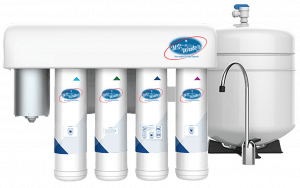If you see particles, sand-like debris, or cloudy water flowing from your tap, you may have sediment in your water. Sediment buildup can occur due to various factors and can affect both the appearance and quality of your water, making it unpleasant to drink.
This issue is particularly common for those who rely on private wells for their water supply. Unlike city water, well water lacks municipal filtering, allowing natural particles to affect water quality. Neglecting sediment buildup can lead to decreased water pressure and damage to pipes, heaters, appliances, valves, fixtures, and faucets.
What causes sediment in tap water?
Sediment in well water mainly originates from the natural environment surrounding the well. When rain or snow melts and seeps into the ground, it carries tiny particles of soil and rock into the well water. Aging plumbing can also contribute to sediment buildup, making it challenging to determine the source without inspection.
Common causes of excessive sediment include issues with well screens or casings, pipe corrosion, oversized well pumps, improper pump placement, and sediment entering the well during drilling or maintenance.
Potential causes of excessive sediment:
- Well Screen or Casing Issues:
- Damaged screens or worn casings may allow sediments into the well.
- Regular inspections (every 10 years) can identify and prevent these issues.
- Pipe Corrosion:
- Corroded iron or copper pipes can introduce sediment into the water supply.
- pH levels, salts, oxygen, and contaminants like iron bacteria contribute to corrosion.
- Well Pump Size:
- An oversized pump can draw in sand, impacting the aquifer.
- Professional assessment and pump replacement may be necessary.
- Well Pump Placement:
- Low-set pumps can draw in sediments like grit or sand.
- Ensure the pump is correctly positioned to prevent sediment intake.
- Drilling Process:
- Sediment may enter the well during well drilling or maintenance.
- Allow time for settled sediment to clear from a new well water supply.
- Well Screen or Casing Issues:
Is sediment in tap water a health hazard?
Most organic sediment does not pose a health threat to humans and pets, but it can be damaging to plumbing and appliances. Over time, those particles can cause staining and spots on clothing, sinks, toilets, appliances, and other fixtures.
Sediment buildup within pipes can also lead to reduced water flow, clogs, and strain or abrasion to plumbing fixtures, potentially shortening their lifespan.
How can I get rid of sediment?
Point of use
Depending on the cause and severity of the sediment, you may choose to filter your water at the point of use, such as the kitchen sink, using a reverse osmosis system for thorough filtration.
Point of entry
Alternatively, if plumbing damage is a concern, you may choose a solution that treats your whole home, beginning at the point of entry. This will help prevent sediment from causing build-up in your pipes or damage to your water appliances.
 Looking for a whole-home system to protect your plumbing & drinking water?
Looking for a whole-home system to protect your plumbing & drinking water?
Not sure which SOLUTION you need?
TALK TO ONE OF OUR WATER CONSULTANTS
715-842-2215
Rent our equipment hassle-free!
Our rental options cover all equipment, offering a trouble-free maintenance agreement plus consumables for your convenience.




